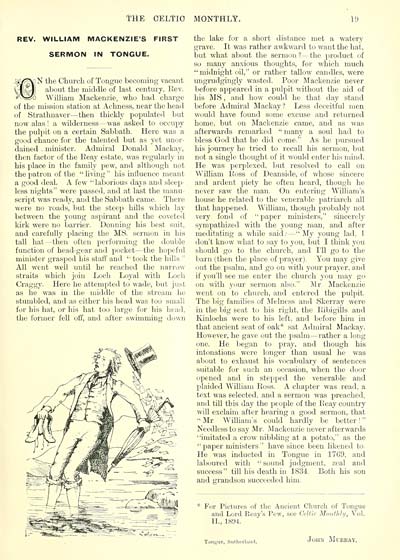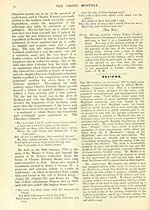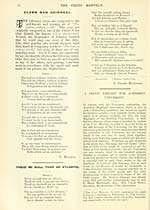Blair Collection > Celtic monthly > Volume 4, 1896
(35)
Download files
Complete book:
Individual page:
Thumbnail gallery: Grid view | List view

THE OELTIO MONTHLY.
1!)
REV. WILLIAM MACKENZIE'S FIRST
SERMON IN TONGUE.
.^/^N the Church of Tongue becomiug vacant
V^k')) '^'^o"*' the middle of last century, Kev.
AVs^ William Mackenzie, who had charge
of the mission station at Achness, near the head
of Strathnaver — then thickly populated but
now alas ! a wilderness — was asked to occupy
the pulpit on a certain Sabbath. Here was a
good chance for the talented but as yet uuor-
dained . minister. Admiral Donald INIackay,
then factor of the Eeay estate, was regularly in
his place in the family pew, and although not
the jjatron of the " living " his influence meant
a good deal. A few "laborious days and sleep-
less nights" were passed, and at last the manu-
script was reaily, and the Sabbath came. There
were no roads, but the steep hills which lay
between the young aspu'ant and the coveted
ku'k were no barrier. Donning his best suit,
and carefully placing the MS. sermon in his
tall hat — then often perfoi'ming the double
function of head-gear and pocket — the hopeful
minister grasped his stall' and '' took the hills "
All went well until he reached the narrow
straits which join Loch Loyal with Loch
Craggy. Here he attempted to wade, but just
as he was in the niidtlle of the stream he
stumbled, and as either his head was too small
for his hat, or his hat too large for his head,
the former fell off, and after swimming down
the lake for a short distance met a watery
grave. It was rather awkward to want the hat,
but what about the sermon? — the product of
so many anxious thoughts, for which much
"midnight oil," or rather tallow candles, were
ungrudgingly wasted. Poor Mackenzie never
before appeared in a pulpit without the aid of
his MS , and how could he that day stand
before Admiral Mackay'? Less deceitful men
would have foimd some excuse and returned
home, but on Mackenzie came, and as was
afterwards remarked " many a soul had to
bless God that he did come." As he pursued
his journey he tried to recall his sermon, but
not a single thought of it would enter his mind.
He was perplexed, but resolved to call on
William Koss of Deanside, of whose sincere
and ardent piety he often heard, though he
never saw the man. On entering William's
house he related to the veneraV)le patriarch all
that happened. William, though probably not
very fond of "paper ministers," sincerely
sympathized with the young man, and after
meilitating a while said; — "My young lad, I
don't kniiw what to say to you, but I thmk you
should go to the church, and I'll go to the
barn (then the place of prayer). You may give
out the psalm, and go on with your prayer, and
if you'll see me enter the church you may go
on with your sermon also." Mr Mackenzie
went on to church, and entered the pulpit.
The big families of IMelness and Skerray were
in the big seat to his right, the Ribigills and
Kinlochs were to his left, and before him in
that ancient seat of oak* sat Admiral Mackay.
However, he gave out the psalm — rather a long
one. He liegan to pray, and though his
intonations were longer than usual lie was
about to exhaust his vocabulary of sentences
suitable for such an occasion, when the door
opened and in stepped the venerable and
plaided William Ross. A chapter was read, a
text was selected, and a sermon was preached,
and till this day the people of the Eeay country
will exclaim after hearing a good sermon, that
" Mr William's could hardly be better 1 "
Needless to say Mr. Mackenzie never afterwards
"imitated a crow nibbling at a potato," as the
"paper ministers " have since been likened to.
He was inducted in Tongue in 1769, and
laboured with " sound judgment, zeal and
success" till his death m 1834. Both his son
and grandson succeeded him.
For Pictures of the Ancient Church of Tongue
and Lord Reay's Pew, see Ceitic Monllihi, Vol.
II., 1894.
Tongue, S\it.herlaiui.
John Mureay.
1!)
REV. WILLIAM MACKENZIE'S FIRST
SERMON IN TONGUE.
.^/^N the Church of Tongue becomiug vacant
V^k')) '^'^o"*' the middle of last century, Kev.
AVs^ William Mackenzie, who had charge
of the mission station at Achness, near the head
of Strathnaver — then thickly populated but
now alas ! a wilderness — was asked to occupy
the pulpit on a certain Sabbath. Here was a
good chance for the talented but as yet uuor-
dained . minister. Admiral Donald INIackay,
then factor of the Eeay estate, was regularly in
his place in the family pew, and although not
the jjatron of the " living " his influence meant
a good deal. A few "laborious days and sleep-
less nights" were passed, and at last the manu-
script was reaily, and the Sabbath came. There
were no roads, but the steep hills which lay
between the young aspu'ant and the coveted
ku'k were no barrier. Donning his best suit,
and carefully placing the MS. sermon in his
tall hat — then often perfoi'ming the double
function of head-gear and pocket — the hopeful
minister grasped his stall' and '' took the hills "
All went well until he reached the narrow
straits which join Loch Loyal with Loch
Craggy. Here he attempted to wade, but just
as he was in the niidtlle of the stream he
stumbled, and as either his head was too small
for his hat, or his hat too large for his head,
the former fell off, and after swimming down
the lake for a short distance met a watery
grave. It was rather awkward to want the hat,
but what about the sermon? — the product of
so many anxious thoughts, for which much
"midnight oil," or rather tallow candles, were
ungrudgingly wasted. Poor Mackenzie never
before appeared in a pulpit without the aid of
his MS , and how could he that day stand
before Admiral Mackay'? Less deceitful men
would have foimd some excuse and returned
home, but on Mackenzie came, and as was
afterwards remarked " many a soul had to
bless God that he did come." As he pursued
his journey he tried to recall his sermon, but
not a single thought of it would enter his mind.
He was perplexed, but resolved to call on
William Koss of Deanside, of whose sincere
and ardent piety he often heard, though he
never saw the man. On entering William's
house he related to the veneraV)le patriarch all
that happened. William, though probably not
very fond of "paper ministers," sincerely
sympathized with the young man, and after
meilitating a while said; — "My young lad, I
don't kniiw what to say to you, but I thmk you
should go to the church, and I'll go to the
barn (then the place of prayer). You may give
out the psalm, and go on with your prayer, and
if you'll see me enter the church you may go
on with your sermon also." Mr Mackenzie
went on to church, and entered the pulpit.
The big families of IMelness and Skerray were
in the big seat to his right, the Ribigills and
Kinlochs were to his left, and before him in
that ancient seat of oak* sat Admiral Mackay.
However, he gave out the psalm — rather a long
one. He liegan to pray, and though his
intonations were longer than usual lie was
about to exhaust his vocabulary of sentences
suitable for such an occasion, when the door
opened and in stepped the venerable and
plaided William Ross. A chapter was read, a
text was selected, and a sermon was preached,
and till this day the people of the Eeay country
will exclaim after hearing a good sermon, that
" Mr William's could hardly be better 1 "
Needless to say Mr. Mackenzie never afterwards
"imitated a crow nibbling at a potato," as the
"paper ministers " have since been likened to.
He was inducted in Tongue in 1769, and
laboured with " sound judgment, zeal and
success" till his death m 1834. Both his son
and grandson succeeded him.
For Pictures of the Ancient Church of Tongue
and Lord Reay's Pew, see Ceitic Monllihi, Vol.
II., 1894.
Tongue, S\it.herlaiui.
John Mureay.
Set display mode to: Large image | Transcription
Images and transcriptions on this page, including medium image downloads, may be used under the Creative Commons Attribution 4.0 International Licence unless otherwise stated. ![]()
| Early Gaelic Book Collections > Blair Collection > Celtic monthly > Volume 4, 1896 > (35) |
|---|
| Permanent URL | https://digital.nls.uk/75847634 |
|---|
| Shelfmark | Blair.56 |
|---|---|
| Additional NLS resources: | |
| Attribution and copyright: |
|
| Description | A selection of books from a collection of more than 500 titles, mostly on religious and literary topics. Also includes some material dealing with other Celtic languages and societies. Collection created towards the end of the 19th century by Lady Evelyn Stewart Murray. |
|---|
| Description | Selected items from five 'Special and Named Printed Collections'. Includes books in Gaelic and other Celtic languages, works about the Gaels, their languages, literature, culture and history. |
|---|

